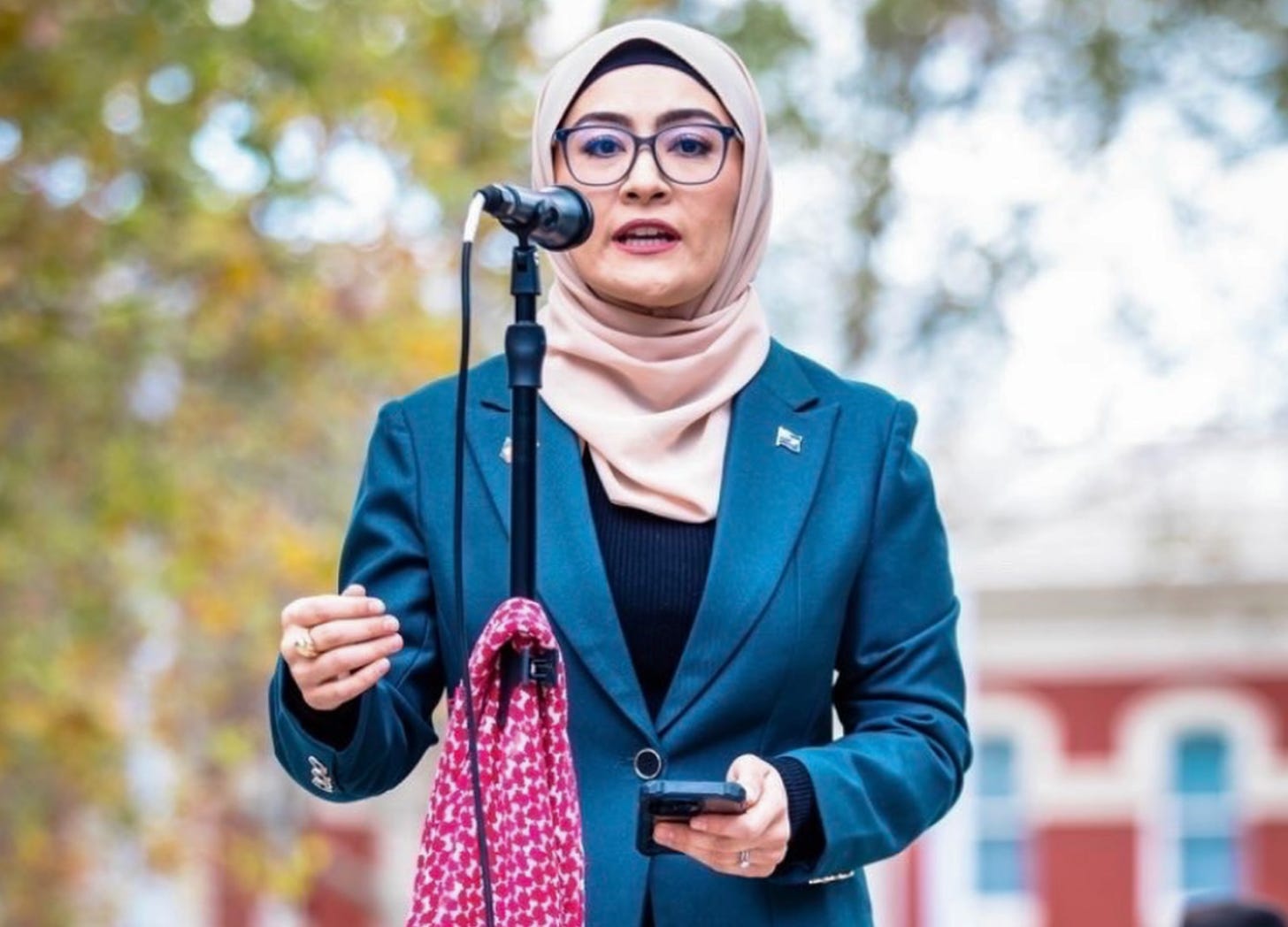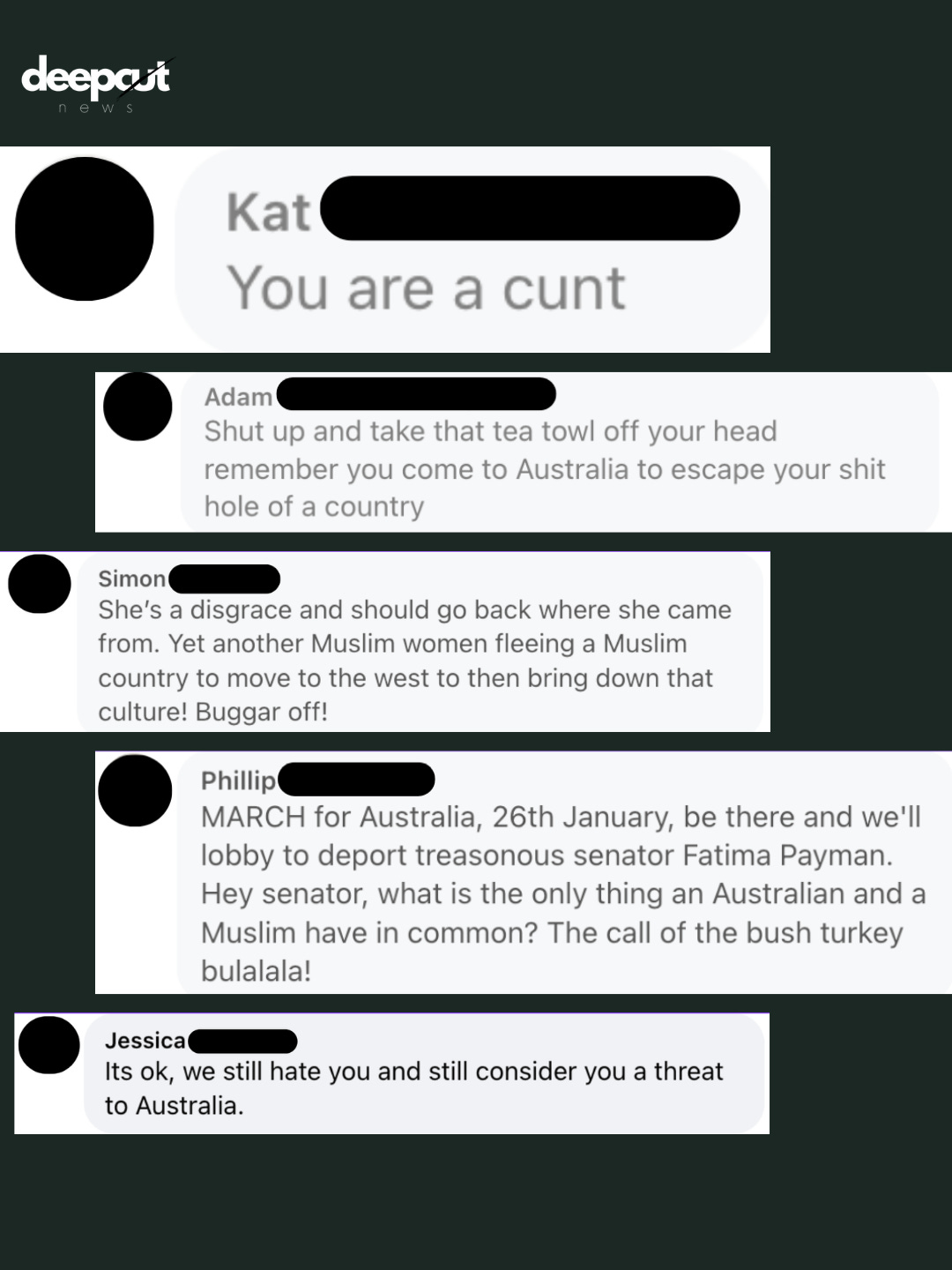Fatima Payman asked the PM to help combat online anti-Muslim hate. He never replied.
The independent senator says her staff are "on edge" as office struggles with inundation of hate
The conviction of a Ballarat man for sending a threatening email to Senator Fatima Payman should have been a win against Islamophobic hate.
Instead, Monday’s sentencing of Sean David Sharman to 18 months of community service, as well as treatment for alcohol and mental health issues, has only opened a floodgate of vile abuse.
“Since then a bigger problem has emerged: there’s a constant stream of vile commentary coming through on our social media,” Payman says. “It’s awful to see that I can’t post photos of me with some school students without seeing hateful comments towards those students, or an update about NDIS funding without hate towards those providers.
“It’s not just one person. It feels like this is targeted.”
Payman has called on the prime minister to publicly condemn the abuse her office has received and provide her staff with more support.
“If we want to deter this sort of behaviour, we need leadership from the top,” she tells Deepcut. “I’ve been reaching out to [Anthony Albanese] about this since becoming an independent senator, but he hasn’t responded to any of my emails or correspondence. It’s a weird space that I’ve found myself in. I’m kind of in limbo.”
The senator says the abuse is taking “a real toll”, explaining her staff are often “on edge not knowing what the next day’s going to hold – what calls we’ll get, what emails will come through, what commentary will be on our social media.”
The prime minister’s office did not respond to questions.
Islamophobia disproportionately targets women
Data from the Islamophobia Register Australia shows Payman’s experience is far from unique.
The Register’s most recent Islamophobia report in March noted “unprecedented levels of in-person incidents and online attacks between January 2023 and November 2024”. Recorded incidents of online hate increased at “more than twice the rate of earlier years” and was especially prevalent on Facebook, Facebook Messenger, Instagram and Twitter/X.
The report noted that Muslim women and girls were the victims in 75% of recorded in-person attacks, while 72% of perpetrators were male. The report also found that the highly gendered element of these attacks was “not merely because Muslim women are more identifiable due to the hijab (headscarf) or niqab (face-veil) some Australian Muslims wear”.
“Because Muslim women are seen as meek, they are also perceived as an easier target of Islamophobic attacks than Muslim men who are seen as violent and domineering,” the report stated.
Payman says that her political profile “encourages some people out there who don’t like what they see.”
“Islamophobia has not only exponentially increased, it targets Muslim women in particular, especially those who wear hjiab.”
‘Women deserve to be safe’
Payman’s case is the latest of several rulings in favour of prominent Muslim and West Asian women bringing cases of racialised abuse and threats to court. Last year, Federal Court Justice Angus Stewart ruled that One Nation founder Pauline Hanson racially discriminated against Greens Senator Mehreen Faruqi after telling her to “piss off back to Pakistan”. Hanson is now appealing the ruling.
In April, Port Macquarie man Michael Dean was convicted of using a carriage service to menace, harass or offend after sending journalist Antoinette Lattouf an email reading: “F*** off back to your shithole racist terrorist country scumbag”.
“Online violence is real. It leaves scars. And women bear the brunt of it,” Lattouf wrote following the decision.
“Women deserve to be safe. Online. Offline. Everywhere. And when they’re not, they deserve the full force of the law behind them.”
In September, Special Envoy to Combat Islamophobia Aftab Malik released 54 recommendations for the government to “address Islamophobia in a systematic manner”.
One recommendation is for the federal parliament to “create a transparent reporting mechanism for constituents and fellow parliamentarians to report Islamophobic speech”. Another is for the Department of Prime Minister and Cabinet to “confront Islamophobia with equivalent urgency to other discriminatory practices” – an urgency that, so far, appears to be lacking.
Despite the vitriol on her social media channels, Payman hopes her successful case against Sharman sends a message that Islamophobic abuse is no longer something that people can engage in with impunity.
“This isn’t about me. This is about ensuring that every woman out there – regardless of where they’re from, what their name is, what they look like, what they wear – feels safe and comfortable in public life or the public domain,” she says.







Thank you for reporting this. This lack of response from Albanese speaks volumes.
These Islamophobic hate-speech cowards should be publicly admonished for the anguish caused, but the truth is that tacit anti-Islam racism (in particular) is more widespread than Australia should want to admit about itself.
Particularly worrying is the “floodgate of vile abuse” in reaction to the Sharman sentencing.
Inaction on the part of Anthony Albanese in this case is even more worrying.
The grim irony is that morally imperative future legal action will only make the problem worse, sending the court system into an unmanageable overload.
www.laugh-or-cry.com